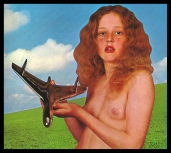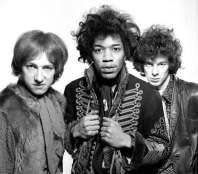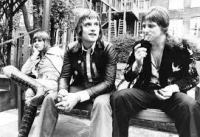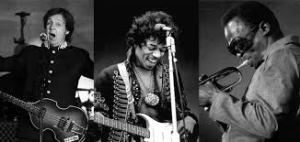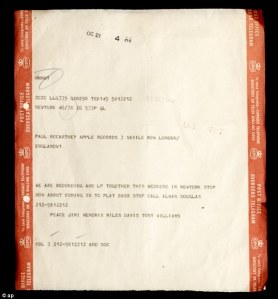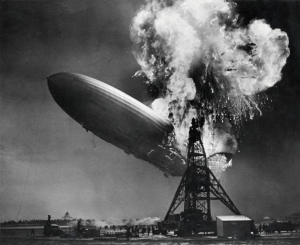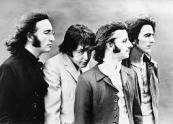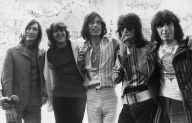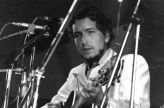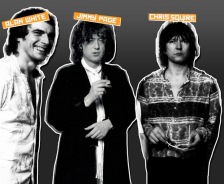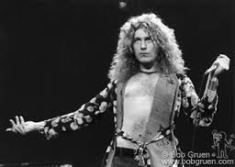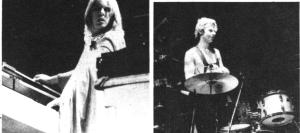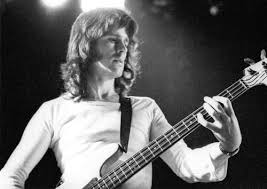The Super Group: a collection of well known stars that band together to make up a highly touted record selling juggernaut, attract all of the attention, get the plum gigs, and of course, get all the girls. Most have failed, few rise above the hype and the lucky ones (usually ones not noted initially as super groups) grab the brass ring of success.
Early super groups were defined by the band Blind Faith. Even the name suggests what the audience should have going into the project. Members of Cream (kind of a pre super group already) and Traffic (ditto another of the first proto super groups) Eric Clapton, Ginger Baker, Steve Winwood and Ric Grech formed a fairly uninspired ‘parts are greater than the results’ band. They combined ideas and personnel to make one middling album (known more for its topless supposed twelve year old girl on the album cover than any music inside), a single 1969 tour that pulled in the dollars but showed the band to be more or less a blues jam band with few real songs, and relied on their former bands for in concert faves. Playing the same Cream songs to increasing hordes of rabid fans who were out of their minds wasted was exactly why Clapton had broken Cream up, so the writing was on the wall. They pulled the plug and quickly faded from memory, thus providing the model for many super groups to follow. (see GTR)
HELP (HELM)-Hendrix, Emerson, Lake and Palmer (Mitchell) 1969
But this article isn’t about the dinosaur era of failed super groups, it is about groups that nearly formed, or formed and then disbanded without any output. You know, the big “what if’s?” of rock history. One of the first of note did not have a name, but was going to be a collision between the most histrionic rock guitarist going, and the most over the top keyboardist of all time: Jimi Hendrix and Keith Emerson. It was to be called either HELP or HELM depending on the final line up. With the end of the Nice, Emerson was looking to retool a band. He had already pooched Greg Lake from King Crimson, and was fishing around for some pieces of the puzzle to round out the band. Supposedly he contacted Hendrix to jam together, and (depending on who you listen to) Jimi came by to sit in on some of the early sessions that yielded Emerson, Lake and Palmer. This is where the story gets a little murky. The one thing that has been documented is that Hendrix and Mitch Mitchell showed up to a rehearsal at Emerson’s studio with a large entourage. Discussions of Mitchell coming on board to round out the trio led to the wild idea of including Hendrix. It is uncertain whether Carl Palmer was in the loop of discussion as of yet as a drum choice. It is likely that, had the project gone a bit further, Hendrix would have had the final say in drummers, and gone with his favorite in Mitchell over the unknown Palmer. British tabloids at the time hinted at the HELP moniker, but a close look at the facts indicate that the HELM lineup likely might have been the final outcome. Witnesses to the first meetings said that the huge drugged out entourage Hendrix brought with him did not lend to the ‘friendly jam’ atmosphere that nascent bands crave in the formative stage, and that Lake and Emerson “freaked out”, and had second thoughts. Still, for any fans of Hendrix and ELP, the thought of two of the most talented point men in rock being able to duel on stage and trade riffs and solos of unimaginable depth is pretty appealing. (Hendrix’s untimely death in 1970 put an end to the proposal). But the jazzier leanings Hendrix was dabbling in at the time make it even more of a tantalizing proposition. Which leads to….
Hendrix, McCartney, Miles Davis and Tony Williams. 1969 This lineup is documented by an October 1969 telegram sent to Apple Records and Paul McCartney trying to get the bass player to show up in New York for the album sessions. Hendrix and McCartney are already a fairly enticing proposition, but throw in jazz legend Miles Davis and phenom jazz drummer Tony Williams? Good god the mind boggles at the thought of what that quartet could have accomplished. Whether Macca would have been one of many bassists on the album or a solid member of the quartet is unknown. But the tantalizing scrap of paper in the Hard Rock Cafe bears witness to something that rock fans can only dream about- a super group that could have rewritten musical boundaries forever. The Hendrix album Nine to the Universe released in 1980 had jazz leanings, and a little known album session with John McLaughlin of Mahavishnu Orchestra fame showed the direction Hendrix was heading. (McLaughlin nixed the release of his jams with Jimi, alluding to crappy playing on his part. I have a bootleg of the session, and McLaughlin gets truly smoked at every turn and is out of sorts with Hendrix, not something a flash guitarist wants on his resume). In the long run, McCartney was on holiday and it is unknown whether he was apprised of the telegram. (Apple was notoriously inefficient in 1969). But this would have been something special, no doubt. A group that would have defined and redefined “jazz rock”.
Led Zeppelin Mk 0, Proto-Zep 1966
This is a band line up that has fueled much speculation and disagreement over the years: Led Zeppelin almost happened in 1966. There is only one enticingly small piece of evidence that documents this incarnation of the proto-band. A barely noticed B-side to a Jeff Beck single (Hi Ho Silver Lining) called Beck’s Bolero had been recorded in May 1966, and quietly slipped out in 1967. A truly earth shaking super group this was too: Jimmy Page and Jeff Beck on guitar, Nicky Hopkins on keyboards, John Paul Jones on bass and Keith Moon on drums. Page and Beck had a short run together in the Yardbirds (Train Kept a Rollin’ in the film Blow Up was their only documented duet), but this single had the earmarks of a real band.
The Who were on the verge of a break up once again (Daltrey had been fired briefly in 1966) and Moon and Entwistle had often discussed a project involving Jimmy Page. Beck was friends with the Who, Page was friends with Beck. It seemed a natural. They even had a name for the project: “Lead Zeppelin”. Whether the original name originated with Moon, Entwistle (many agree this was the source) or future Zep manager Peter Grant (pretty much only he agrees he is the source) is unclear. Page has tapped Moon as the origin and Entwistle was adamant that Grant was quietly present at his and Moon’s initial drunken discussions and stole the idea, including that Entwistle had even thought the project out to include the Hindenburg in flames on their first album cover (which Grant also promptly nicked). Soon the Who and Moon had kissed and made up, and this idea was put on the backburner to simmer for a couple of years.
Strange *Bitches* Brew-Miles Davis, John, McLaughlin, Larry Young, Tony Williams, Etic Clapton and Jack Bruce-1970

I am surprised that there is no mention of this one anywhere on the internet, because it would have been pretty mind bending. This proposed band is only documented in two summer 1970 Rolling Stones issues, but is later corroborated by an interview with Miles himself at the time. Rumors had it that Miles wanted to be a rock star, and that he would fuse the yet to be formed Bitches Brew crew with Clapton and Bruce from Cream. In the June 1970 issue, there is a short article entitled “Eric Joins Miles’ New Rock Group” with a photo of Clapton. Miles had said in an interview “I think I can put together a better rock n roll band than Jimi Hendrix”. (the aforementioned proposed 1969 Hendrix/Miles configuration would weigh in here in relation to that statement) Although he later backed off the rock braggadocio rhetoric, this was a period where Miles saw jazz as a foundering art form, and the 1968-1969 era had pushed rock stars meteorically to the top. When Rolling Stone published this article in June of 1970, it also announced a concert debuting this group at a festival on Randall’s Island New York July 17th-19th, 1970. Jack Bruce had been working with Tony Williams Lifetime, which included McLaughlin and Young, so this made more sense then than it might to 21st century eyes.
But in the next issue, things got a little wiggly. Under the title “Miles & a Lot of Different Bitches” the author referred to a ‘formerly reliable source in London’ that had fed him the story-which might have been not as true as portrayed. Or was it? The story goes on to say that the concert will take place as planned, with the lineup as listed. The source for this? Miles himself.
From Rolling Stone: ‘When he first read it, he said, Miles decided to cancel the gig. Then after consideration, Miles decided to let ego be damned. He knew he wasn’t going to knock off Jimi Hendrix, and so did Tony. Besides with Lifetime-two of whose members, Williams and McLaughlin, had performed with Miles-not to mention Clapton, the musical possibilities were far out, to Miles’ way of thinking.
“So we’re going to do it like it was planned”, said Miles. “There’s not going to be no egos involved”. The only thing that seemed to concern him is that he’d been listening to a Cream album, with Clapton and Bruce in full flight. and “they play loud, man.” Miles said he had been recording with trumpet amplification on one of the several Davis LPs awaiting release, and maybe “if they’re gonna play loud, I’ll plug into an amplifier too.”
Needless to say, the concert never happened, but the jazz end morphed into the famous Bitches Brew album. But listening to Miles, this event almost happened, and someone out there knows a lot more about this. Miles seemed pretty sure it was going to happen. Someone needs to ask Clapton about this.
Beatles, Stones, Dylan form a single band 1969
Before passing out of the sixties, another proposed band has recently come to light. In the realms of the word super group, this one would have been a doozy: a nine piece band comprising Bob Dylan, Mick Jagger, Keith Richards, Charlie Watts, Bill Wyman, John Lennon, Paul McCartney, George Harrison and Ringo Starr. Yep–Dylan, the Beatles and the Stones, all in one band. Producer Glyn Johns let this one out in his recent book. According to Johns, the impetus for this project came solely from Bob Dylan. He wanted to make an album with the most influential song writers of the 1960’s, and see what the combined talents could collaborate on to produce. The time period would have been the summer of 1969-Self Portrait era of Dylan, post Brian Jones Stones, and the chaos of Let it Be for the Beatles. Johns had worked for years on the Rolling Stones production end, and Dylan was intrigued by his recent work with the Beatles. Despite Dylan’s enthusiasm, only George Harrison and Keith Richards jumped at the chance and tried to gather support. Wyman, Ringo and Watts waited to see what others would do, and Lennon felt ambivalent. McCartney and Jagger would not even consider it for a second, perhaps reflecting the power struggles then going on in both bands. Despite the cachet these names generate, it is hard to see how this would have played out. Collaborative song writing? If real, then it would have been something we’d still be analyzing to this day. But other luminaries were sidling up…
Pompeii-Mott the Hoople and Mountain Form a Band That Everyone Ignored 1976-8
The tale of Pompeii is actually pretty standard seventies rock stuff-take stars from fading bands, reshuffle the deck, and see what happens. Record companies did this all the time, dating back to the proto days of rock. By the mid 70’s Mott had crashed and burned with lead singer Ian Hunter and former Bowie axeman Mick Ronson leaving the band to go adrift on their own for solo waters. Corky Laing watched Mountain fade into irrelevance by the end of 1974. Elektra/Asylum offered Laing a chance to get a supergroup together, and a band began to coalesce around Laing, Ian Hunter, Andy Fraser from Free, Steve Hunter from Alice Cooper (but perhaps more famous for the instrumental guitar section to open Sweet Jane on Rock n Roll Animal by Lou Reed) and keyboard legend Lee Michaels. No recordings of this version exist, and the band seemed doomed when producer Bob Ezrin left them for Pink Floyd’s upcoming project.
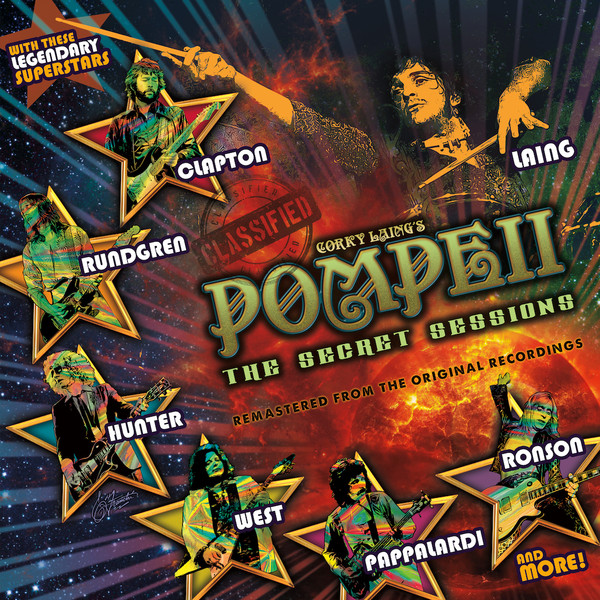
With the band dissolving, Ian brought in Ronson and Laing brought in Felix Pappalrdi on bass and Pompeii was back on track-half Mott and half Mountain. It worked. Most of an album was recorded, and the label let the band know it wasn’t going forward. Eventually in 2018 a 10 song lp finally chronicled the band no one had ever heard of-forty years later. Some decent Laing/Hunter compositions line the very 70’s sounding release, but the monumental song, Outsider, makes this album worth finding for the meltdown jam and furious delivery by Hunter that surpass it’s eventual release in 1979 on Ian’s You’re Never Alone With a Schizophrenic lp. Highly recommended for 70’s arena rock fans looking for an unknown gem.

XYZ (ex Yes and Zeppelin) 1980
Fast forwarding a decade comes a super group that strikes very close to home: XYZ. Representing eX Yes and Zeppelin, XYZ was formed in late 1980 as both Yes and Led Zeppelin had imploded (the former due to a break up during the failed follow up to Tormato, the other by the death of John Bonham.).
Bonham’s death clearly brought Zeppelin to a halt, but more obscure is the temporary demise of Yes in 1980 that set the table perfectly for the band to happen. When Yes failed to come up with a follow up to Tormato, they imploded in Paris. Roy Thomas Baker was at the helm, and the band bickered endlessly. Writing was strained and Jon Anderson tried to wrestle control and impose his will upon the band, a very un-Yeslike attitude. (Songs of this era showed up on bonus tracks of Drama and the Anderson solo album Song of Seven. They are excruciatingly bad.) So when Alan White broke his ankle during the sessions, Rick saw his opportunity and wisely bolted for the door.
At the time, two of my favorite bands had just jumped the rails, and my lifelong search to finally see Led Zeppelin live summer 1980 was thwarted by Bonham’s untimely death. Whispers by those who had insider information spoke of XYZ-Robert Plant, Jimmy Page, Chris Squire and Alan White. Holy Crap–talk about a consolation prize! I anxiously awaited further news. I carried around a 1981 clipping from a local newspaper from a ticket scalping agency for the better part of a decade. Around the border were upcoming big concerts they were pushing: The Rolling Stones, Springsteen, AC/DC…the hottest tours of the biggest bands circled in a border around the advert. But one caught my eye, the elusive XYZ. Was there going to be a tour? Holy shit! But then….an information black out. Nothing in the news anywhere about this. What was going on?
In reality, Page, White and Squire had gotten together with former Greenslade keyboardist David Lawson to combine forces. As a front man, the obvious choice was Robert Plant. Rehearsals in early 1981 progressed well, but Plant dropped out after a single session with them, citing lingering trauma from Bonham’s death. Other sources claim the songs being written were straying into an unfamiliar ground as Squire and White drew Page into much trickier uncharted territory-fluctuating time signatures, stops and starts and evolving key changes–the hallmarks of prog rock and Yes. Plant found this material out of his comfort zone and a bit too “tricky” for his liking. Whichever excuse you prefer, Plant was out. This left Squire and David Lawson as vocalists, but the initial momentum and enthusiasm began to wane as rehearsals continued. Disputes over management between Brian Lane of the Yes camp and Peter Grant of the Zep camp did not help. (The aborted sessions produced some tantalizingly rare outtakes, which finally have surfaced in the bootleg underground and are readily available to the skilled internet surfer). Finally both parties realized that this was headed in the wrong direction without Plant to tie it together, and they went their separate ways. Some of the more finished material ended up on the rare Squire/White single, Run With the Fox (which featured Lawson).
Other material ended up on the 1983 Yes reformation album 90125. One song ended up on a Page/Rodgers Firm album (Fortune Hunter).
One of the ‘trickier’ pieces finally surfaced 15 years later as Mind Drive on the 1997 Keys to Ascension2 Yes album. For many Yes fans, this was the last decent original song they ever released.
Few know that its origins have Jimmy Page rattling around in there somewhere. But this wasn’t the only aborted Yes project of the era….
In the background of this was the easily disaffected keyboard genius Rick Wakeman. Rick had once famously consumed sausage sandwiches on his grand piano while playing on the 1974 Tales From Topographic Oceans tour to show his disapproval of the material and horrify the recently vegan turned Anderson and Howe. His solo stuff had plateaued by the end of 1976 and his options were open:
WWB-Wakeman, Wetton, Bruford 1977
Bolting Yes in 1980 wasn’t the first time Wakeman had pulled a vanishing act. The first time was post Tales, in 1974. Wakeman was horrified at Anderson and Howe’s vegetarian, anti drug and ultra spiritual renaissance, and he departed. His Yes solo album had become a side project that then became a fairly large draw as a solo act, but then large and overblown stage productions for Journey to the Center of the Earth tour (performed around a lake with inflatable monsters bobbing up and down from the surface) and The Myths and Legends of King Arthur and the Knights of the Round Table tour (performed around a skating rink with ice skating characters, and orchestra and choir) drained finances like burning money in a stove by the end of 1976. A solution was in the offing, and America had the answer. With ELP effectively off the road, a keyboard led supergroup was needed. That group was Wakeman Wetton and Bruford, WWB. John Wetton and Bill Bruford had most recently played together in the final 70’s version of King Crimson, and were nearly telepathic in their playing. Wakeman? Well as he himself has noted, was an unofficial member of the UK Olympic Drinking Team. This seemed doomed from the start, but they hung together for six weeks in May-June 1977, took promo photos on a James Bond movie set, had press releases out and record companies lined up. Unfortunately, the execs pumped up Wakeman’s already inflated ego with promises of ELP styled mega events with him at the helm. They also proposed a 50-25-25 split of the finances, something that Wetton and Bruford could not swallow. With accountants running with contracts after them, the band fell apart. Wakeman quickly rejoined Yes replacing Patrick Moraz, while Wetton and Bruford enlisted Eddie Jobson and Alan Holdsworth for the more sedate and complex band, UK. The bombastic WWB never saw the light of day. Two songs of their work survived–Beelzebub surfaced on a Bruford solo album, and Thirty Years on the first UK album.
Recent and past history has provided many an example of super groups that fizzle out upon launch. But these bands continued and actually toured and released albums, and it’s possible the same fate may have struck the above mentioned bands. But time and events will not let us know how this would have played out. Intriguing combinations at intriguing inflection points of history lead to intangibles, eh?
One thing I do know, I really would have loved to see Jimmy Page in a progressive rock band. I carried that clipping around for quite a while.
“What if?” indeed.
